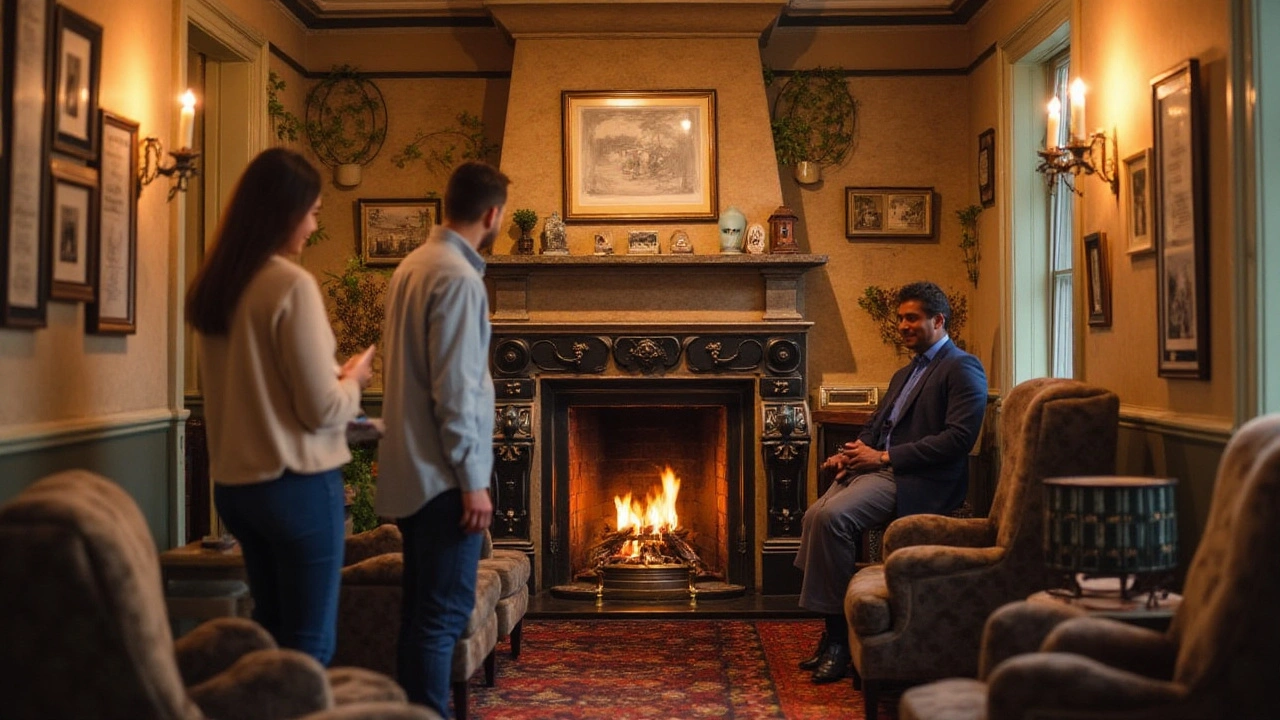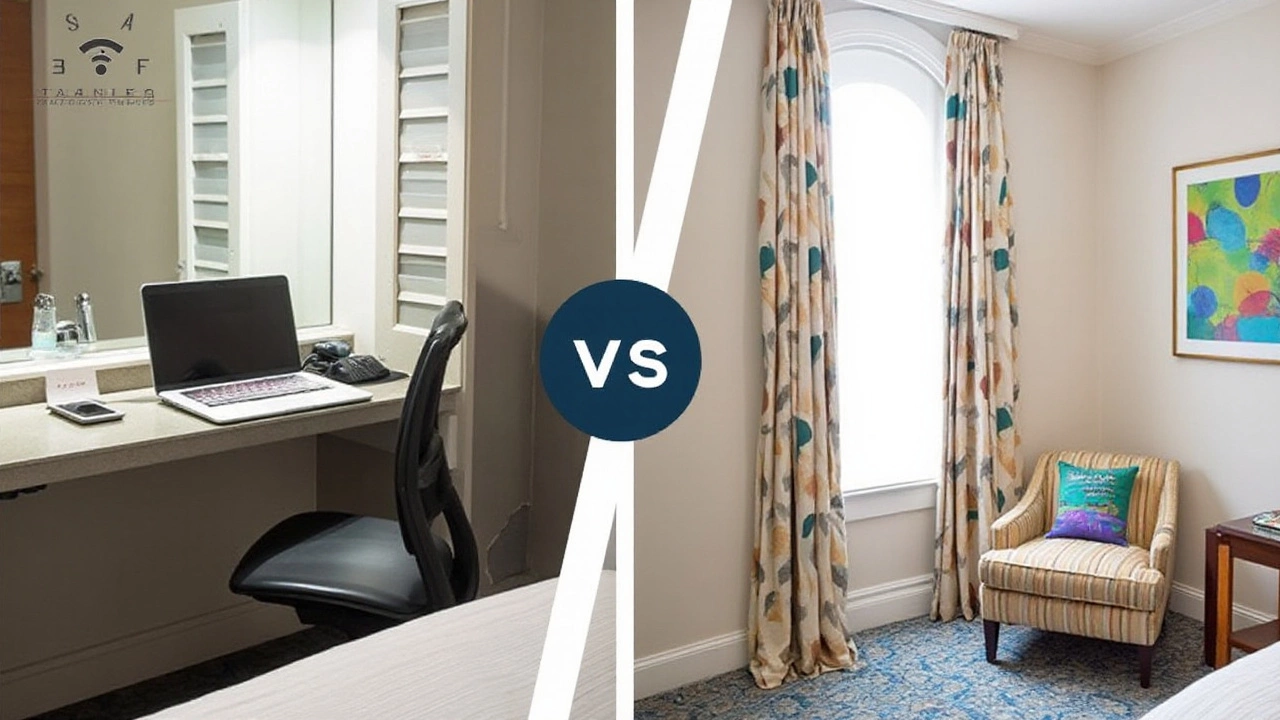Business vs. Boutique Hotels: What's the Distinction?
5 Nov, 2024When planning a trip, whether for work or leisure, choosing the right hotel can make or break the experience. For those not in the know, business and boutique hotels may seem like just a place to rest your head. Yet, these two types of accommodations are worlds apart in what they have to offer.
Business hotels cater primarily to travelers with a professional bent, offering services like conference rooms, high-speed internet, and other must-haves for a productive stay. They're often located near business districts or transportation hubs, blending convenience with functionality.
Boutique hotels, on the other hand, offer an altogether different vibe. With their emphasis on style, individuality, and personalized service, they're magnets for those seeking a unique and memorable experience. Often smaller and more intimate, these hotels can be found in trendy neighborhoods or historic areas, ensuring guests feel like a local during their stay.
- Defining Business Hotels
- Understanding Boutique Hotels
- Amenities and Services
- Target Audience and Location
- Choosing the Right Hotel for Your Stay
Defining Business Hotels
Business hotels, also known as corporate hotels, are a staple for travelers who prioritize convenience and productivity. These accommodations are strategically placed in proximity to city centers, business districts, or major transport hubs, making accessible travel a key feature. They range in size from large hotel chains to smaller but equally well-appointed establishments. The primary aim of a business hotel is to offer an environment that facilitates seamless work experiences while also providing a comfortable oasis after a long day of meetings and presentations. For instance, amenities like conference rooms, private meeting spaces, and secretarial services are often available, fostering a working ecosystem akin to a home away from the office.
These hotels are built around efficiency and practicality, where the clock guides every design choice. Guests can expect fast and reliable high-speed internet, crucial for emails, video conferences, or accessing cloud-based work tools. In recent years, many business hotels have upped their game with digital check-ins and mobile room services to minimize time wastage at the front desk. The rhythm of a business hotel is also reflected in its round-the-clock facilities. Whether it's an early work session or a late check-in from a late-night flight, the 24-hour fitness centers, business centers, and concierge services are at arm’s reach. There is no time of day where one can't attend to work or indulge in some much-needed downtime.
"The demand for business hotels continues to grow as they provide amenities and services that are specifically tailored to business travelers, such as meeting rooms and business centers," said a senior analyst from STR, a firm specializing in global hospitality data and analytics.
The décor of business hotels often treads the line of modern minimalism, offering a neutral palette that speaks to a global clientele. These spaces might not boast extravagant luxury, yet they project a sophisticated sense of calm that helps focus the mind. This taste-geared design extends to rooms which are more about comfort and functionality. Expect ergonomic workstations, various charging ports, plush bedding, and black-out drapes, all harmonizing to recharge both your gadgets and your own batteries by the next morning.
Dining in a business hotel serves a dual function. It caters to culinary tastes while also serving as a venue for discussions and networking. The in-house restaurants typically offer a breakfast buffet designed with an array of options catered to an international palate. Some even include conference facilities that can be hired for working breakfasts or lunch meetings. If more privacy is required, room service is often available 24/7, allowing guests to dine while ticking off their to-do lists in comfort. For a break from the laptop, business hotels frequently have lobby bars, which are ideal spots for informal chats or unwinding with colleagues after an intensive day.
Understanding Boutique Hotels
Boutique hotels have carved a niche for themselves in the hospitality industry, offering a one-of-a-kind experience that larger chains often can't provide. The term "boutique hotel" was first coined in the early 1980s when a small, stylish hotel opened in New York, revolutionizing the concept of what lodging could be. These establishments are known for their unique design, intimate ambiance, and personalized service that focus on creating memorable guest experiences. They often reflect the culture and heritage of the location, integrating local art, architecture, and cuisine into the guest's stay.
What sets a boutique hotel apart is its commitment to character and individuality. These hotels usually have fewer than 100 rooms, lending a cozy, exclusive feel uncommon in larger establishments. The decor is typically thematic, often chic and modern, with an emphasis on aesthetics and detail that appeals to the stylish traveler. Intriguingly, these hotels often reside in converted historic buildings, from old industrial lofts to charming townhouses, providing a sense of place and history.
The service at boutique hotels is a significant part of the appeal. Staff members go the extra mile to ensure guests feel special and valued, often remembering returning customers by name and catering to their specific preferences. It's not unusual for these establishments to offer bespoke services like curated tours of the surrounding area or personalized spa treatments, crafting a stay that's as individualized as it is luxurious. Guests are treated to a level of attention that larger hotels can't always match.
Location plays a pivotal role in defining a boutique hotel. You won't find them in areas swarmed by massive hotel chains; instead, they're often tucked away in trendy neighborhood districts or historical areas, granting guests unparalleled access to local shops, entertainment, and culture. This proximity to local attractions is another factor that draws the modern traveler, providing an opportunity to explore off-the-beaten-path venues that tourists in big-brand hotels might miss.
Interestingly, boutique hotels often support local artists and businesses, with in-house galleries, locally sourced restaurant ingredients, and special events that highlight local traditions. This commitment to the community not only enhances the guest experience but also contributes positively to the local economy. It's this symbiotic relationship between the hotel and its surroundings that truly defines the boutique experience.
"Boutique hotels are increasingly becoming a popular choice for travelers seeking a distinct, more personalized experience," says independent hospitality expert Sarah Andrews. "Their unique sense of style and commitment to providing exceptional guest services offer a refreshing alternative to the conventional hotel stay."
This distinct blend of hospitality and style is what continues to elevate boutique hotels in the competitive hotel industry. As more travelers seek meaningful and immersive travel experiences, these unique accommodations have proven to be more than just a place to rest—they're an integral part of the journey itself. With every detail thoughtfully curated for comfort and culture, a stay at a boutique hotel feels like coming home to a place you've never been before, yet one that somehow feels distinctly familiar.

Amenities and Services
The amenities and services offered by business hotels and boutique hotels differ significantly, mainly driven by the target clientele and the style of each type. In a bustling business hotel, the amenities often center around functionality and efficiency. From fast Wi-Fi and ample power outlets to conference rooms equipped with the latest tech gadgets, everything is set up to boost productivity. They might also offer business centers with printing services, dedicated workspaces, and coffee shops that serve as informal meeting venues.
In stark contrast, boutique hotels invest in creating a distinct atmosphere, often reflecting the locale's culture or the owner’s personal style. Their amenities are tailored towards personalization and comfort. Guests can expect cozy reading nooks, artful decor, and bespoke service from a staff that knows your name. Restaurants in boutique hotels often emphasize local cuisine, offering a culinary journey as part of the stay. Such hotels might provide curated tours or experiences that introduce guests to hidden gems of the city.
It's not just about what's on paper, though. The difference in services is palpable in the way they’re delivered. In business hotels, efficiency and speed are prioritized. A request to the concierge might result in a quick phone call or solution within minutes. Check-ins and check-outs are swift, minimizing time spent at the desk. Some might even offer express services where guests can bypass traditional procedures using a dedicated app or portal. In boutique hotels, on the other hand, the service tends to be intimate and personalized. A concierge might not just provide directions but offer insider tips and reservations at charming local spots or suggest a hidden gallery tour.
A notable hotelier once said, "A hotel should relieve travelers of their insecurity and loneliness. It should make them feel taken care of while they're in it," encapsulating the philosophy many boutique hotels thrive on. Indeed, these hotels aim to create emotional connections and lasting impressions beyond the mere transactional nature of traditional big-name establishments.
There's also a discernible difference in how these establishments approach leisure and wellness. A business hotel might offer a well-equipped gym that's open 24/7, recognizing that global travelers might work on different time zones. Alternatively, boutique hotels might focus on holistic and unique experiences like yoga on the terrace at dawn or wine-tasting evenings led by local experts. Such activities are crafted to engage the traveler in more than just the physical sense of well-being.
Target Audience and Location
Business hotels cater primarily to a distinct demographic of travelers—the ones who are always on the go and juggling a packed schedule of meetings, conferences, and events. These travelers often include corporate employees, sales representatives, executives, and anyone else on a business trip. Business hotels position themselves strategically, often in bustling city centers, close to company headquarters, convention centers, or major transportation hubs like airports and train stations. This makes them the perfect choice for guests who need easy access to workspaces and timely commute options. Travelers in this category usually prioritize efficiency, often seeking accommodations that provide express check-in/check-out services, mobile-responsive booking options, and flexible meeting facilities.
Location plays a significant role in a business hotel's allure. Not only are they conveniently located for the work-oriented traveler, but they are also equipped with plentiful amenities designed to optimize work efficiency. These include on-site business centers, conference rooms, Wi-Fi connectivity, and tech-savvy facilities to ensure productivity on the road. Moreover, there's often 24-hour customer service available to accommodate different time zones work schedules, providing everything needed to work seamlessly while away from the office.
"A great location is essential for business travelers as it saves precious time and ensures swift transitions between work engagements and relaxation," remarks travel expert James Everhart.
In contrast, boutique hotels are magnets for a different kind of traveler—those seeking an experience beyond just a night's sleep. These hotels appeal to leisure travelers, couples on romantic getaways, and even locals looking for a unique staycation. Known mostly for their charm and character, boutique hotels offer a personalized touch that large hotel chains may lack. The target audience here is keen on experiencing a blend of style, culture, and comfort. Boutique hotels often occupy niche locations, like vibrant districts known for art and fashion, or quiet spots that offer scenic views. This distinctive positioning allows guests to immerse themselves in the local ambiance and explore neighborhoods that aren't as crowded as traditional tourist hubs.
For patrons of boutique hotels, the focus is on creating memorable moments. The unique décor and design celebrate the local culture or history, and the hospitality is personalized, often with a staff that remembers your name. Guests can expect lavish amenities too: from curated mini-bars and personalized concierge services to boutique spa services and gourmet dining experiences featuring local flavors. Such attributes appeal to a variety of demographics, including millennials who value authenticity and baby boomers drawn to nostalgia and curated experiences. Moreover, the locations of boutique hotels allow guests a delicious taste of the surrounding culture right outside their doorstep, whether it's a trendy café or a hidden art gallery.

Choosing the Right Hotel for Your Stay
When it comes to deciding between a business hotel and a boutique hotel, the choice rests heavily on the specific needs of your trip. Are you on a whirlwind work tour where punctuality and efficiency take precedence? Or are you looking for a vibrant cultural escape? The answer to these questions helps illuminate the path to your ideal hotel experience. The specifics of each type might help sway your decision based on what each has to offer in terms of convenience and character.
For travelers with packed schedules full of meetings, presentations, or client dinners, a business hotel might be your best bet. These hotels are often strategically located near major business centers, airports, or conference venues. They offer amenities like shuttle services, express check-ins, and dedicated business centers equipped with computers, printers, and even secretarial services. Consider the convenience of having a 24-hour front desk or access to quick meal options as these small details can improve your travel experience significantly.
Conversely, if your trip leaves room for sensory and cultural exploration, a boutique hotel may be where you want to rest your head. These hotels often stay closely tied with their locale and offer a design-forward experience characterized by personalized service. They're typically situated in culturally rich neighborhoods or architectural districts, often acting as little havens of creativity and inspiration. With less emphasis on hustle and bustle and more on indulgence and revelry, many boutique hotels boast on-site bars, art installations, and thematic rooms that make each stay unique.
To decide which hotel is right for your stay, it's essential to consider additional factors beyond just location and amenities. Examine the kind of experience you want to have—from the hospitality style to room decor and potential leisure activities. Personal preference plays a vital role, but doing a bit of research can ensure that your needs are met, and expectations surpassed. The plethora of online reviews and ratings can also offer both insights and tips from other travelers who have stayed at the venue of your choice. And remember, prices might fluctuate based on season, so keep your travel dates flexible if you’re looking for a good deal.
Another important aspect to consider is loyalty programs. Many business hotels offer enticing loyalty schemes, rewarding frequent travelers with discounts, upgrades, or even free nights. If flexibility is your mantra, a boutique hotel could introduce you to a wide array of independently run establishments, each with its essence. Granted they might not always offer loyalty points, a worthwhile trade-off might just be the extraordinary stories you collect along the way.
"The ultimate hotel stay is about finding a place that caters to your needs, allowing you to experience life from a new perspective," an experienced traveler once remarked.
As you weigh your options, keep in mind what comfort looks like to you, balancing modern amenities and charming atmosphere to result in the perfect stay. Whether you land at a bustling business hub or a cozy, quaint boutique, choosing the right hotel can transform your travel experience to one that's memorable, comfortable, and exactly what you need it to be.

 by
by